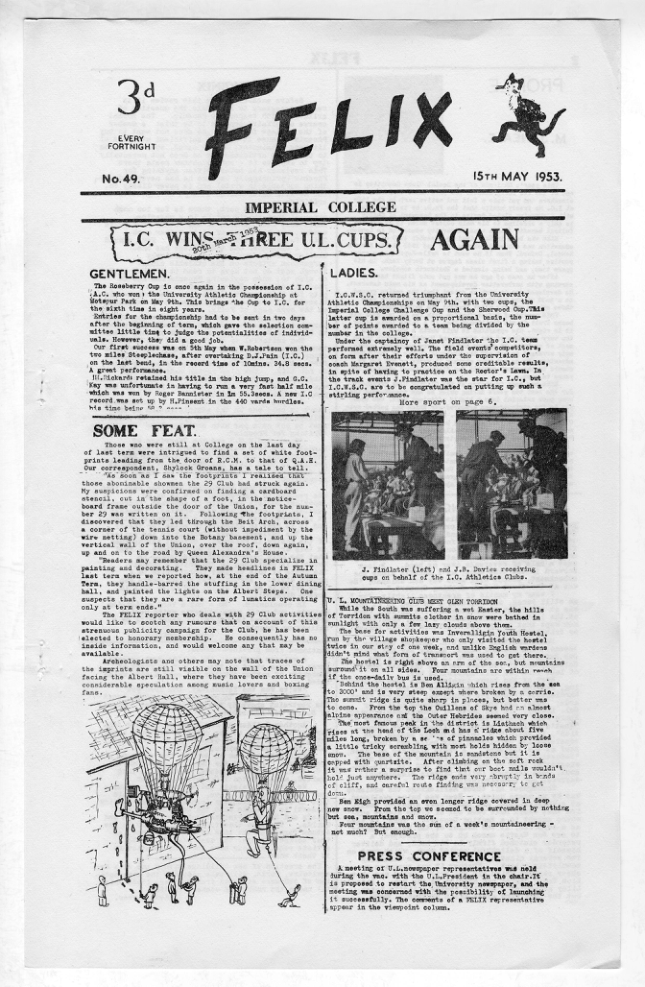I.C. Debates
"That Science & Technology do not constitute University education in its fullest sense" was debated in the Gym on Thursday, 4th. Two mathematicians were the proposer and opposer, and stated their cases fairly precisely.
Professor Semple of King’s proposed the motion. He started by pointing out that science is only one field of human knowledge; and anyone concentrating on science and technology loses touch with the other fields of knowledge. He thinks only of concrete things, and loses his sense of values which is so essential to full education. He gave as an example his own stay at Cambridge, where students of all faculties lived, ate and talked together; and how he was far more interested in and instructed by his friends from the arts side than from the science side. Replying to people who quoted the Industrial Revolution as their argument, he said that it was started by scientific advances, and brought on many evils such as child labour. It was not until people - non-scientists - insisted that such conditions cannot go on that an improvement was brought about. The scientist today has the means of producing enormous power. But he has no control over it. Today more than ever, he should have the judgment to see that his labours are not put to dangerous use. The scientist must develop his sense of values, and he cannot do this by learning only science and technology. He therefore is not fully educated.
Professor Levy opposed. There is no reason, he said, why a scientist should not have knowledge of as wide a variety of subjects as any other person. A really deep scientific study of any object - Professor Levy's pipe for example - will need knowledge of a considerable number of other things. Science, taught properly, will also teach the student to think of things like the men who made the pipe, the country from which its wood came, and so on. A science student carries out an experiment, and gets some results. He then proceeds to generalize the result, even as we identify ourselves with a character in a novel. His generalization is true only over a certain range. To determine that range, he needs judgement and a sense of values. A scientist. furthemore. seeks only truth, in fact he dare not tell a lie: and truth is a value. The fully educated man is one whose pattern of knowledge and pattern of values fit together. A person cannot be a scientist unless he is human in the first place; scientists and humans are not two different races. The senses of value and judgment developed in the laboratory are applied in the world because their holder is the same person, whether he is inside a laboratory or outside it. A proper training in science and technology does therefore mean a full education.
Mr. A. Peacock, supporting, pointed out how an average science student comes to his lectures and goes back from them too tired for anything else, thus losing all touch with other things. Scientists in big firms were always in the back rooms, not in the Board rooms, for they cannot express themselves. The leaders were politicians who.after all, are only people who can speak well.
Mr. Just said that it depends entirely on the student whether he is fully educated or not. In London in particular, one can satisfy any interest or curiosity one may have. The three years of intensive training in one field were essential to anyone who wanted to find a proper place in the world.
Speeches from the floor were mainly in opposition to the motion. It was pointed out that scientists were in the Board rooms in other countries, & that ULU has far more officers from the science side than from the arts. The voting was seven for, sixteen against, four abstentions. Many people had left before the debate finished, for it was getting late. The time, 5.15 p.m., was obviously not suited to a number of people who were probably too tired for anything else after their lectures and lab. work. Nevertheless, Professor Levy is understood to have remarked that the floor speeches were of the highest standard he had ever heard.




